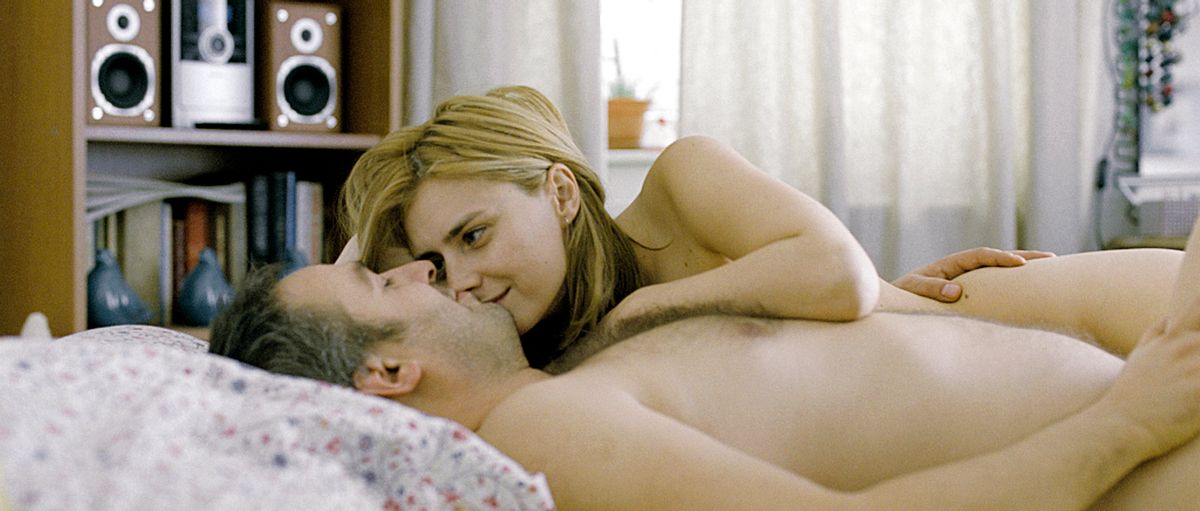"Tuesday, After Christmas" goes down pretty smooth, with a sneaky-powerful aftertaste. Yes, it's a Romanian film, but one set in an intimate, highly recognizable middle-class world of consumer capitalism, not some ultra-grimy zone of art-house despair. Its central romantic triangle, if that's not too glorious a term, involves a 40ish financial professional, his wife (who seems to be a lawyer) and his mistress (the family dentist). These people eat at McDonald's when they're in a hurry, debate whether to send packages by UPS or DHL, buy their daughter Barbie paraphernalia and a snowboard, plan a vacation in the Austrian Alps. Their homes are decorated in the neutral, tasteful style of the international semi-affluent bourgeoisie. And beneath the sleek, pleasant surface of their lives, suggests director Radu Muntean, dark forces are stirring like sea monsters in a placid sea. (This is Muntean's first American release, but he's almost as well known in Romania as Cristian Mungiu of "4 Months, 3 Weeks and 2 Days" and Cristi Puiu of "The Death of Mr. Lazarescu.")
Muntean opens the movie with a long, seemingly sunny, single-take scene of the likable, silver-haired Paul (Mimi Brănescu) in bed with the young, blond Raluca (Maria Popistaşu). They're naked and have clearly just made love; the filmmaker is counting on the fact that we'll be drawn in by the post-coital mood and by the beautiful female nude, presented almost as an art-history odalisque. At first we don't know anything about Paul and Raluca's relationship, but something in their tentative talk of the future and in Paul's manner -- simultaneously cajoling and manipulative -- begins to fill in the blanks. When Raluca utters the name "Adriana" the scene's mood shifts. We'll meet Adriana (Mirela Oprişor), a petite, intense brunette, shortly. She's the wife, and Raluca is the other woman.
All of "Tuesday, After Christmas" is shot this way, in extended, carefully choreographed takes rich with dialogue, that feel almost like live theater. There are some devastating Chekhov-comedy collisions in the middle scenes, but the three characters come together only once, when Adriana shows up for a conference about her daughter's orthodontia, completely unaware that the woman attaching the braces is also screwing her husband. (Raluca later refers to this scene as a "close encounter of the third kind," and it does possess an almost out-of-body character.) I didn't try to count, but there can't be many more than, say, two dozen shots in the entire movie. But Muntean's impressive technique never feels like an end in itself; it's more like he creates a transparent window that brings us face to face with the inescapable moral issues within Paul's quandary. And make no mistake, this is a moral fable, disarmingly simple and fatefully complicated, about a basically decent and honest guy who is treating his marriage and family like a commodity, to be traded in for a newer, shinier model.
On the one hand, Paul has fallen in love with Raluca, as he eventually confesses to Adriana, and in Woody Allen's famous words, the heart wants what it wants. Most viewers, male or female, will identify with Paul's predicament to some degree (if we're being honest with ourselves). And you don't want to resort to clichés like "he's forgotten what's really important in life"; I don't think Muntean is arguing that personal happiness or erotic love don't matter, or that people should stay married if they're miserable. Issues that might be central in a different kind of movie are deliberately not addressed in this one, which focuses entirely on a few fateful days in the Yuletide season. Is Paul actively unhappy with Adriana, or just bored and restless? Does Raluca want to marry Paul and start a new family? Has this dumb bastard actually thought about the pain he's inflicting on his wife and daughter, or about the basic principle that what goes around is likely to come around?
By declining to address those questions, and by making Paul more of a sympathetic figure than a villain or an incurable rogue, Muntean is actually twisting the knife way more deeply. I'm sure that in Romania "Tuesday, After Christmas" reads like an indictment of a particular class, and of the so-called freedom that came after the 1989 revolution, but outsiders shouldn't confuse that with nostalgia for the Ceausescu dictatorship. (I'm pretty sure the number of Romanians who feel that way is zero.) More broadly this is a resonant, vivid and finally heartbreaking tale about the universal difficulty of marriage and the endless self-delusion of the human condition, driven by a trio of amazing dramatic performances. Best of all is Oprişor as the devastated but ferocious Adriana, who tells Paul, "You are the biggest disappointment of my life," and then must go through all the Santa Claus rituals of one last family Christmas.
"Tuesday, After Christmas" is now playing at Film Forum in New York, with other cities and DVD release to follow.



Shares